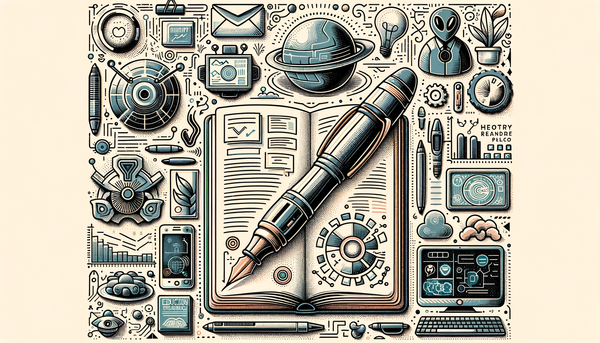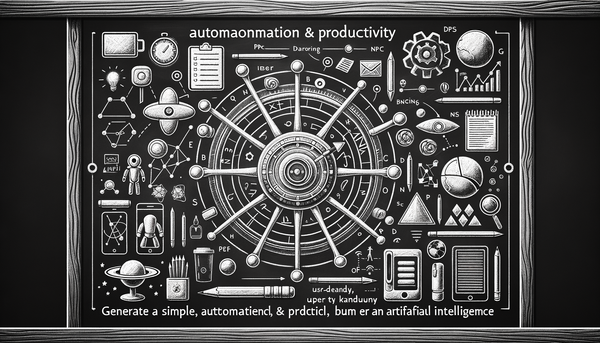Amazon Revamps Alexa and the Rise of AI

This article explores the rapidly evolving landscape of artificial intelligence, delving into breakthroughs that range from China's innovative adoption of DeepSeek models in everyday appliances to Nvidia's record-breaking Q4 performance and CEO Jensen Huang's advocacy for AI-powered learning. It also examines Amazon's revamped Alexa and Apple's monumental $500 billion AI investment, while highlighting Microsoft's efficient new Phi-4 models that are poised to democratize advanced computational capabilities. With insights drawn from Reuters, Entrepreneur, CNBC, Euronews, ABC News, Forbes, and VentureBeat, this comprehensive piece navigates the intersections of technology, business strategy, and innovation in the AI sector.
AI's Expanding Frontier: From Domestic Gadgets to Revolutionary Classrooms
The AI revolution has never been more palpable. Today, we see artificial intelligence embedding itself in virtually every aspect of our lives — from the smart appliances in our homes to the learning platforms that empower our educational journeys. A significant signal in this evolving narrative is the rapid adoption of China's DeepSeek AI models, which have begun to reshape everyday consumer products, including televisions and vacuum cleaners, as highlighted by an insightful Reuters article.
This move by Chinese manufacturers not only showcases the increasing accessibility of advanced AI technologies but also underscores the global shift towards integrating AI into daily life. The adaptability of DeepSeek's models to consumer electronics marks a transformative moment where technology once relegated to data centers or research labs now finds a home in domestic settings. Reflecting on this trend, one can recall the renowned words of Jack Ma:
“Artificial intelligence is not just about automating processes, it’s about transforming industries and making people’s lives better by solving complex problems.”
This successful integration of AI into consumer devices serves as an evocative reminder that the work being done in established tech giants is rapidly being mirrored by innovations emerging from dynamic tech ecosystems across the globe. When everyday products become smarter, the implications for efficiency, user experience, and even energy consumption are substantial.
Democratizing Knowledge: AI Tutors as Catalysts for Empowerment
Navigating the new era of learning requires not only traditional educational tools but also a mastery of emergent technologies. Nvidia CEO Jensen Huang has been a vocal advocate for the integration of AI tutors—a sentiment captured in an engaging Entrepreneur article—encouraging a reformed approach to acquiring knowledge.
Personalizing education using AI tools like ChatGPT or even advanced platforms such as Perplexity's AI has allowed Huang to unlock new avenues for exploration into multifaceted topics. “I feel more empowered” is a refrain echoed by educators and learners alike who have experienced the benefits of these tutors in real-time. Huang’s commitment to mastering the art of interacting with AI underlines a broader trend: the digital transformation of education is not just a possibility but an imperative.
Learning how to effectively prompt AI systems has emerged as a key competency in today's technology-driven society. This skill enables users to extract more nuanced, precise, and contextually relevant responses, thereby facilitating a deeper understanding of complex subjects—from programming intricacies to scientific theories. However, Huang also offers a cautionary perspective, noting that increased reliance on AI may bring about challenges such as error-prone responses and the looming specter of job automation. This is not a call to reject AI, but rather an invitation to engage with it responsibly, ensuring that its integration into our academic and professional lives is both effective and ethical.
Voice Technologies Reimagined: Amazon's Revamped Alexa
One of the front-runners in bringing AI to the general public is Amazon, which has recently introduced a revamped version of its voice assistant, Alexa. As detailed in a recent Amazon AI update and further expounded by another revolutionary insight on AI.Biz, the new Alexa comes equipped with enhanced artificial intelligence features that are set to redefine user interactions.
Priced at just $19.99 per month—with free access for Prime members—this upgraded tool combines convenience with cutting-edge technology. The evolution of Alexa signifies a broader trend towards embedding AI in everyday interactions, making sophisticated technology accessible to the masses. By integrating more natural language processing capabilities and smarter contextual understanding, Amazon is shifting the paradigm of digital assistants from simple voice command machines to robust, interactive platforms capable of managing a wide range of tasks.
For many, Alexa has become synonymous with home automation. Yet, its latest iteration hints at even greater potential. From managing intricate household schedules to potentially integrating with smart home ecosystems in ways that predict user behavior, the new Alexa offers an exciting window into the future of consumer electronics. It also highlights the competitive interplay between major tech companies, each striving to push the boundaries of artificial intelligence.
Nvidia's Remarkable Journey: Record Earnings Amidst a Shifting Landscape
Nvidia's transformational journey in the AI industry has been nothing short of extraordinary. With explosive growth since 2023, Nvidia has captured global attention not just through its technological innovations but also its stunning financial performance. Two significant narratives from Euronews and ABC News detail the company's dramatic Q4 performance, marked by a 78% revenue jump to $39.3 billion.
Central to this success are Nvidia’s Blackwell chips, which power a new generation of generative AI applications renowned for their enhanced reasoning capabilities. The record sales, reportedly peaking at $11 billion, underscore how robust demand for smarter AI models is reshaping the semiconductor industry. The revenue surge, alongside strong data center sales that climbed by 93%, positions Nvidia as a dominant force in a landscape now defined by exponential technological progress.
Nonetheless, it is critical to note that behind these impressive figures, there are nuanced challenges. As highlighted in these reports, the underlying "base effect"—stemming from historically high performance—suggests that maintaining triple-digit growth in future quarters may prove challenging. Additionally, the competitive presence of China's DeepSeek, whose affordable AI models have started diverting investor attention, implies that Nvidia's path forward is set against a backdrop of intensified global rivalry.
In the spirit of balanced analysis, one must appreciate how such market dynamics drive not only competition but also innovation. Nvidia's performance story underscores a broader principle: the pace of advancement in AI is inherently cyclical, characterized by explosive growth spurts followed by necessary corrections as the market matures. This reminds us of a perennial business paradox: rapid innovation invites both exhilarating highs and challenging recalibrations.
Investing in the Future: Apple's Monumental AI Commitment
When discussing transformative investments in the tech world, one name inevitably rises to prominence: Apple. According to an in-depth Forbes article, Apple has embarked on an unprecedented $500 billion journey into artificial intelligence. This bold investment is aimed at not only enhancing existing products but also at fostering futuristic innovations that could revolutionize how users interact with technology.
Such a significant financial commitment signals that Apple is poised to lay the groundwork for a future in which AI is seamlessly integrated into its ecosystem. From improving the intelligence of personal devices to pioneering novel research and development projects, Apple's $500 billion bet illustrates the strategic importance of AI as a cornerstone of tech innovation in the coming decades.
Critics and industry experts alike view this move as a calculated risk that underscores Apple’s confidence in the transformative potential of artificial intelligence. By channeling vast resources into AI research, Apple is setting the stage for breakthroughs that could mirror, or even exceed, the impact seen with previous disruptive technologies. It further solidifies the notion that the competitive race in AI is not just about incremental improvements but about fundamentally reimagining how technology supports and enhances human lives.
Smaller Yet Mightier: Microsoft's New Phi-4 Models
In a world that often equates size with strength, Microsoft's new Phi-4 AI models challenge that notion by showcasing how efficiency and smart engineering can triumph over raw computational heft. Detailed in an engaging VentureBeat article, these models—Phi-4-multimodal and Phi-4-Mini—demonstrate that high performance does not necessarily demand bulky hardware.
The Phi-4 models, with 5.6 billion and 3.8 billion parameters respectively, are engineered using a technique called “Mixture of LoRAs.” This clever approach allows them to process text, images, and speech concurrently while consuming considerably less power than their larger counterparts. In some tasks, these models even rival or outperform larger models, establishing a new benchmark in both efficiency and versatility.
This paradigm shift is immensely significant for industries where computational resources may be limited or where operational efficiency is a fundamental requirement. For instance, in manufacturing environments, hospitals, or even smart vehicles, the ability to deploy powerful AI models on constrained hardware without sacrificing performance is a game changer. It serves as a vivid demonstration that in the AI domain, innovation often resides in thoughtfulness of design rather than just scale of resources.
Strategic Competition and the Broader Impact of AI Technologies
The competitive dynamics among tech giants have never been more intense or nuanced. On one hand, traditional leaders like Nvidia continue to set the bar with significant revenue surges attributed to their cutting-edge chips. On the other, rising competitors like DeepSeek are challenging existing narratives by offering cost-effective alternatives. DeepSeek’s incursion into consumer electronics, as noted by Reuters, coupled with market reactions following claims of AI model competitiveness against established products such as ChatGPT, underscores the fervor of this race.
This competitive interplay forces established players to evolve while also opening opportunities for new market entrants. The discourse is not merely about technological supremacy; it is also about fostering a diverse ecosystem where innovation thrives through both competition and collaboration. Market analysts have observed that while Nvidia remains a powerhouse, the gradual shift in revenue growth signals a leveling off—a natural adjustment as AI technologies mature and the “AI gold rush” becomes more measured.
One of the key insights emerging from this competitive environment is the necessity of coupling technological innovation with ethical and effective implementation. With technology advancing at breakneck speed, practitioners and consumers alike must remain vigilant. As Elon Musk once remarked,
"The pace of progress in artificial intelligence is incredibly fast. Unless you have direct exposure to groups like DeepMind, you have no idea how fast—it is growing at a pace close to exponential."
This underlines the importance of continuously adapting both our strategies and policies to ensure that AI's evolution benefits all segments of society.
Bridging Technology, Business, and Everyday Life
What all these developments have in common is their impact on both consumer experiences and broader economic structures. Artificial intelligence is not confined to the laboratories of tech giants—it is now woven into the fabric of daily life. Amazon’s Alexa upgrade enhances how we interact with our homes, while Apple's gargantuan AI investment and Microsoft's innovative models influence entire sectors spanning from healthcare to transportation. Moreover, the successful deployment of AI tutors is reshaping the educational landscape, empowering learners through personalized learning experiences.
By fostering an environment where advanced technologies are seamlessly integrated with real-life applications, we see not just improved efficiency but also an opportunity to reimagine the future. For example, imagine a household where your television adjusts its settings based on contextual cues powered by DeepSeek AI, or a classroom where every student has a personal AI tutor guiding them through complex subjects. Such advancements not only enhance productivity but also democratize access to information and expertise.
For those interested in exploring the interplay between advanced AI applications and everyday effectiveness, recent coverage on Amazon's AI-driven initiatives can be found in our related articles on AI.Biz. These articles provide further insights into how tech giants are integrating AI into consumer products, a trend that is likely to continue reshaping our daily lives.
Looking Ahead: The Future Trajectory of AI
The future of artificial intelligence promises a fusion of efficiency, accessibility, and innovation. As we observe continued investments from industry giants like Apple and rising stars like Microsoft's Phi-4, complemented by ongoing improvements in existing technologies by companies like Nvidia and Amazon, one thing is clear: AI is poised to become a ubiquitous part of our lives.
However, with such rapid development comes the responsibility to manage AI's impact on society, economics, and the job market. While AI tutors open new learning horizons and smart devices bring convenience, there is an equally important dialogue about ensuring that the benefits of technology are equitably distributed and its challenges proactively addressed.
As we integrate these sophisticated systems into our daily routines, the lessons from global innovators encourage us to remain both enthusiastic and cautious. The story of AI is one of progressive transformation—one that requires a commitment to ethical play, transparency in advancement, and a shared vision for a smarter, more connected future.
Further Readings and Resources
For those eager to dive deeper into the multifaceted world of artificial intelligence, here are some additional resources and articles on related topics:
- Amazon AI Unveilings: Alexa Innovations and Breakthrough Research
- Amazon's Bold Leap with a Revamped Alexa: Industry Impact
- Meet Alexa+: The Next Generation of AI Assistance
Additionally, refer to articles by Reuters, Entrepreneur, CNBC, Euronews, ABC News, Forbes, and VentureBeat for a more detailed understanding of global trends and first-hand accounts of these transformative developments.
Final Thoughts
As I reflect on the remarkable shifts taking place within the realm of artificial intelligence, it’s impossible not to be awed by the pace of change. From the subtle integration of AI in our homes to the monumental strategies that underpin global tech investments, these developments collectively illustrate that we are on the cusp of an era defined by intelligent systems working seamlessly with human ingenuity. Whether you’re a tech enthusiast, a business leader, or simply a curious mind, the journey of AI is one that promises endless opportunities and challenges. In embracing these opportunities, we must stay informed, remain critical, and harness these transformative tools to shape a future that is innovative, equitable, and remarkably smart.



